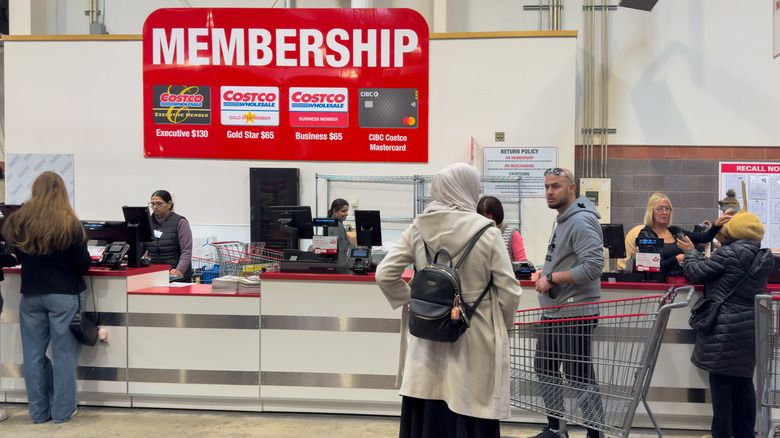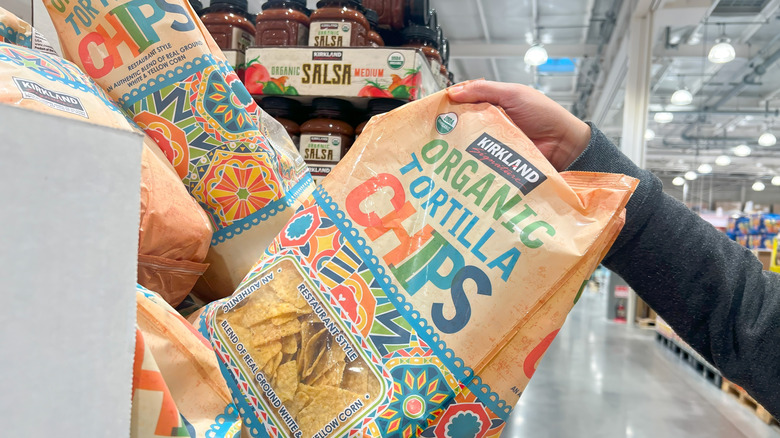Here's What Happens To Costco Items After You've Returned Them
Costco is well known for its incredible "Risk-Free 100% Satisfaction Guarantee" return policy, one that gives the big-name warehouse an estimated return rate 2-3 times higher than the average retailer. You can return just about everything. Mostly eaten or totally untouched, broken or unopened, Costco gladly accepts returns for a full refund on almost everything, and that's just part of what you should know about Costco's hassle-free return policy.
On the whole, Costco's returns can be broken down into two categories: First, foods and perishables, and second, all other non-food-related items. From there, the returns then fall into the resalable, defective or damaged, and discard piles. The sorting of each depends on not only the demand of the item, but the managers in the particular warehouse and the general quality of the returned item. Every Costco return can fit into these categories and subcategories, from electronics to furniture to prepared foods, and while Costco's return policy is extremely lenient, what happens to the goods isn't always as simple as putting items back on the shelves.
What happens to perishable items returned to Costco?
Costco will accept almost any kind of food return for almost any reason. Whether you open the box and hate the taste so much that you want a return or you accidentally purchased one too many cans of green beans, Costco will give you a full refund on your food items. There's even an unusual Costco rule that allows refunds on partially eaten food, so you don't have to worry about foods expiring before you finish it. Although you'll get your money back, foods returned to Costco do not go back on the shelves under any circumstance.
It's too much of a liability for Costco to allow pre-purchased foods for re-purchase, even if it's wholly unopened. Costco has no way of knowing where the food has been or what's happened to it, even if you only have it in the car for a few minutes before you run back inside to return it. The food may be spoiled or tampered with, or it may be completely fine, but it's a risk that Costco can't take, so any returned foods are thrown away. When it comes to prepackaged foods, say a box of Pop-Tarts that are too sweet to finish, according to a Costo employee who runs the YouTube channel, The Costco Dude, Costco works with food banks and other organizations to try and get the undamaged goods in the right hands, although unfortunately most returned foods simply end up in the trash.
What happens to non-food-related returns at Costco?
Any returns that aren't food or perishables fall into this non-food related category, whether that's clothing, furniture, home goods, or other merchandise. From here, the return process can be lengthy — but not for you, you'll get your money back and be on your merry way. Your items, however, go through a rigorous sorting process. If the items are unused, unopened, or in good condition, they'll go back on the floor almost immediately, typically at a discounted price. Don't forget how to decipher Costco price tags for the best possible deal, since tags that end in .00 or .88 usually mean it's a returned but sellable item at a lower price.
If the returned non-food items are damaged, defective, or too severely used, there are a few ways it can go. Again, you'll still get your refund, but the items can end up in different places. If the items are clearly used, opened, or only slightly defective, Costco will cut its losses and liquidate the items. The retailer works with contractors to sell the items at a cheaper price, which will then be sold on liquidation sites. If items are too damaged or defective for liquidation, then they're sent back to the original vendor. Vendors that work with Costco will give the retailer partial credit for defective items, so Costco isn't entirely at a loss.
Costco return facilities keep things running smoothly
Although returned items are rigorously examined by multiple Costco personnel before ever returning to shelves, some items require a special process, in which case these items are sent off to a Costco return processing facility separate from your standard Costco warehouse. These facilities can handle the more complex returns in a way that day-to-day Costco employees cannot. Technology is also heavily involved with the process through the use of the Costco Inventory Management System (CIMS), which tracks returns and updates inventory in real-time. It's also a way to make sure that customers don't abuse the return policy or break other Costco membership rules.
While you can't shop at these return processing facilities, the warehouses do work together to determine where the complicated returns will end up, whether that's in the landfill or donated to local partnerships and charities. If you happen to find a returned Costco item back on the shelves at your local warehouse, you can trust that it's been thoroughly examined by Costco staff and deemed safe and in a good enough condition for resale. At the end of the day, most people would agree that Costco does have a better return policy than Sam's Club, relentless inspections included.



